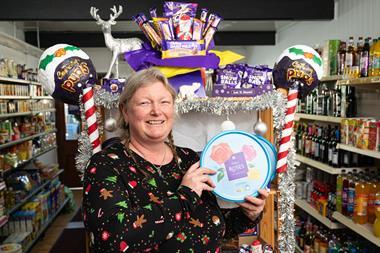Mention Easter to many small retailers and you’ll often be on the receiving end of much eye-rolling and a heavy sigh. While the spring season as a whole, with all its mini and filled egg sales and St Valentine’s Day-inspired boxed choc purchases, is seen as a welcome post-Christmas boost for c-stores, Easter weekend can be seen as a let down.
Price competition from the multiples means that many retailers just don’t bother with selling shell eggs any more or bespoke Easter gifts come to that.
However, Hancocks senior buyer Jonathan Summerley says that it would be a generalisation to say that smaller retailers could no longer profit from selling shell eggs. “Such a store has the advantage of flexibility, knowing their particular locality and picking up a great deal of impulse sales.”
There is a growing view that rather than looking for cheap deals, retailers should forget competing on mid-price shell eggs and instead look at the higher end of the market. As Easter weekend looms, a mixture of reduced choice and good old-fashioned guilt forces consumers to trade up. Cadbury’s trade communication manager Kate Harding points out: “If you’ve predictably left your purchase to the last minute you’d better buy the best and most expensive to show how much you care about your partner.”
Just like Christmas
Nestlé category development manager Stewart McGuckin says retailers should be looking at Easter in the same way as they do Christmas: “Male shoppers at the last minute are happy to spend £30 on three eggs. They buy Christmas on Christmas Eve and treat Easter in the same way.”
Summerley agrees: “We would suggest that the biggest shell egg opportunity would be with larger branded eggs which are rarely the centre of price wars with supermarkets. The multiples tend to fight over the smaller eggs and this certainly seems likely to be the case for 2010.”
Sarah Walley, customer marketing executive at luxury brand Green & Black’s, says: “Last year Green & Black’s saw shoppers purchasing later in the season, with 60% of shell egg sales being made in the two weeks prior to Easter.”
In fact, the whole of the category breathed a sigh of relief last year after the blink-and-you-miss-it 2008 season. According to Graham Walker, Nestlé UK trade communications manager: “Last year more shoppers bought into the category, shopped more often and spent more at Easter. This is great news for retailers because Easter is all about confectionery.”
According to Walker, impulse sales did well in 2009 up 11% over the total market growth of 9.7% (IRI total market value sales Easter/Nestlé), with symbols up 23% and independents up 7.2%.
Mars trade relations manager Bep Sandhu agrees that the longer season in 2009 helped. “Having Easter back in April in 2009 meant that it gave retailers time to stock and people time to shop, meaning that last year was definitely better overall.”
While the season is one week shorter this year, manufacturers are still expecting growth.
Box clever
Ferrero customer development officer Levi Boorer says that retailers who aren’t willing to gamble on expensive eggs shouldn’t forget the non-egg market. “If you were bought an Easter egg then you probably think the person bought it at half-price, but you wouldn’t think the same about a box of chocolates.”
He says that retailers should still be thinking about playing slightly on the safe side, though, so as not to end up with bespoke stock left over.
While the Easter weekend itself is all about larger eggs, there is still an opportunity for mini, filled and self-eat, says Harding. “Filled egg sales increase by about 30% in the final week of Easter (Nielsen 2009). However, there is a strong demand in the week after with sales falling back to the same levels as the week prior to Easter weekend, so this is an ideal opportunity to maximise seasonal demand.”
Sandhu says that there may even be an opportunity for retailers to sell smaller eggs over the Easter weekend: “People get together with friends and family and Easter eggs may not be appropriate for friends, but having a token gift is and it’s a great novelty.”
“You don’t get any profit on Easter eggs any more because they’re on promotion at three for a fiver. But we are still being undercut by the multiples, which sell them for £1 cheaper than we can buy them for! “I wanted to give our store a point of difference last Easter so we made up our own gift packs. For a boy, we wrapped up a football with an Easter egg to sell as a package. The mults couldn’t offer this and so everyone was buying them up. It was such a success that we took photos of the displays we’d designed and sent them to other Spar stores in the area to give them ideas for making up their own gift sets.” Celine Molloy, manager, Spar Knocklynn, Coleraine
Pastures new Out last year but with a small distribution, Bluebell has made it into the Nestlé core range this year. Bluebell will be supported by a £500k women’s press campaign. According to Nestlé, 70% of Easter gifts are for children. rrp: £1.99 tel: 01903 604 604 Here’s hopping Following the success of the 2009 self-eat MaltEaster Bunny, Mars has introduced the MaltEaster Luxury Egg. The egg comprises a 314g hollow shell egg with four MaltEaster Bunnies. Eggs come in outers of four. rrp: £7.49 tel: 01844 262517 Find the rabbit The Lindt Gold Bunny is receiving special treatment this year. The ‘Find the Lindt Gold Bunny’ competition will offer prizes such as family holidays and giant 1kg Lindt Gold bunnies. TV, press, radio and online ads will support the promotion. tel: 020 8602 4100 I should Koko Cadbury is following its launch of Koko chocolates with an Easter offering. The Koko egg is targeted at women and includes a Cadbury Shell Egg with five Koko truffles. It comes in two sizes: 100g (rrp £4.99) and 200g (rrp £6.99). tel: 0870 2400861 Retro lives on Nestlé is revisiting an old favourite, the Smarties mug egg. Last seen on shelves in 1995 the Smarties egg comes in classic brown and white branding with a retro mug. It is being backed by a national press ad campaign. rrp: £5.49 tel: 01903 604 604
Easter weekend isn’t all about stuffing your face with chocolate, being second only to Christmas as a big family occasion. In fact, it doesn’t seem five minutes since you’ve closed the door on your Christmas visitors when they’re all descending on your dining table again for Easter lunch. Hancocks’ Jonathan Summerley says there are opportunities in many categories: “Smaller retailers stand to do well over Easter, as local shoppers find a quick stop off at the local store more preferable to battling around a busy supermarket. Aside from chocolate, other top pick-ups are likely to be crisps and snacks, alcohol and probably milk. Independents should view the Easter break as a positive opportunity and stock up accordingly.” Aunt Bessie’s customer marketing controller Colin Billing says that the season is huge for the company: “It remains a time when families traditionally come together and mum’s always busy in the kitchen. We see strong sales throughout the autumn/ winter period, although as we begin our promotional activity generally three to four weeks before Easter these sales pick up again then.” And after lunch there is always room for cake, as Premier head of marketing for seasonal Simon Hawkes points out. He says that seasonal cakes including those at Easter scoop about £100m of the £1bn total cake market, with Easter the second fastest growing sector behind Halloween, growing by 26% year on year in 2009. Premier is introducing up to 12 extra lines for Easter, including Mr Kipling Lemon mini classics and Lemon French Fancies. Lemon, it seems, does very well at Easter: “There’s a massive push on lemon cakes and we can only boil it down to the association with the colour yellow and spring.” He adds: “Everyday cakes do well early on, then as it gets closer to Easter it gets more special and chocolatey. And Simnel Slices feature, too.”




























No comments yet